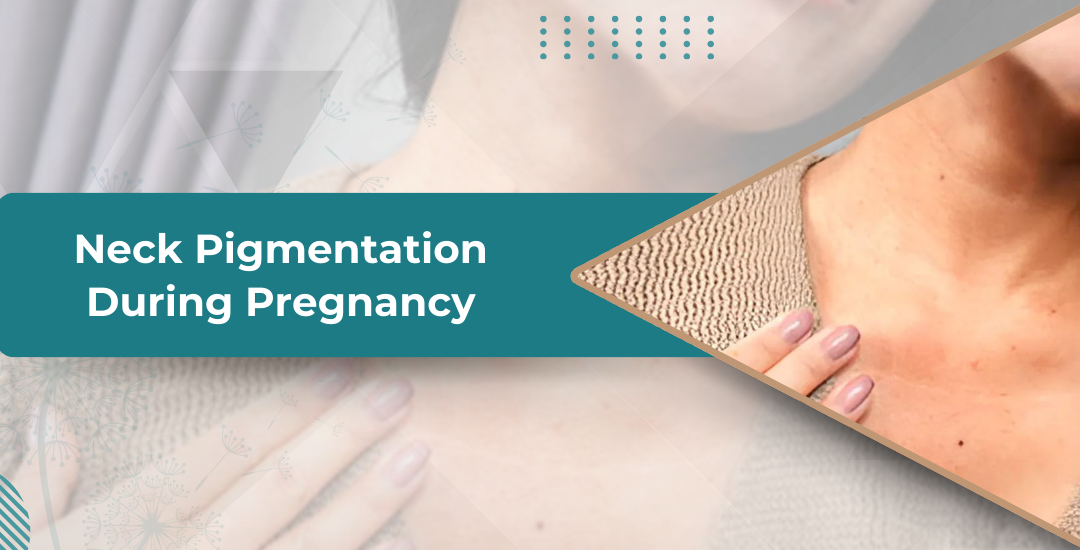Pregnancy is a time of incredible transformation for a woman’s body, both internally and externally. While many women glow with radiance, others may notice unexpected changes in their skin, such as neck pigmentation.
Dr. Swetha P, founder of Cosmoderm Centre, a world-class Skin Clinic in Indiranagar, explains:
“Neck pigmentation during pregnancy is a common concern due to hormonal shifts that stimulate melanin production. Understanding the causes and effective management strategies is crucial for maintaining healthy, glowing skin.”
In this blog, we’ll explore why neck pigmentation occurs during pregnancy, how common it is, whether it poses any risks, and ways to manage and prevent it.
Let’s begin with the causes!
Causes of Neck Pigmentation During Pregnancy
Increased Melanin Production
Significant hormonal fluctuations during pregnancy, including increased levels of estrogen and progesterone, can stimulate melanocytes.
Dr. Swetha explains, “Melanocytes are the cells responsible for melanin production, the pigment that gives skin its color. Stimulated melanocytes produce more melanin, resulting in dark patches or hyperpigmentation on neck during pregnancy.”
Sun Exposure
Due to hormonal changes, pregnant women may be more sensitive to sunlight, making them more prone to developing dark spots or patches on the neck and other areas.
Genetic Predisposition
A family history of melasma or other types of hyperpigmentation can increase the likelihood of developing neck pigmentation during pregnancy.
Skin Sensitivity
Increased sensitivity during pregnancy can lead to more pronounced pigmentation, especially when combined with other factors like sun exposure or friction from clothing.
Preexisting Skin Conditions
Women with a history of skin conditions such as melasma or post-inflammatory hyperpigmentation may find that these conditions worsen during pregnancy. The hormonal shifts can trigger or intensify preexisting pigmentation issues.
Nutritional Deficiencies
Deficiencies in certain nutrients, such as vitamins B12 and folic acid, can affect skin health and contribute to pigmentation changes.
Noticing dark patches on your neck during pregnancy? Consult a trusted skin specialist for tailored solutions to keep your skin healthy and glowing.
How Common is Neck Pigmentation during Pregnancy?
Neck pigmentation is quite common among pregnant women. Studies suggest that approximately 50-70% of pregnant women experience some form of hyperpigmentation, including darkened skin on the neck, face, or abdomen. This condition can vary in intensity, with some women noticing only faint discoloration while others may experience more prominent dark patches.
Dr. Swetha, a prominent dermatologist in Bangalore, adds:
“Women with darker skin tones are more prone to developing pigmentation changes during pregnancy due to the naturally higher levels of melanin in their skin. Additionally, those with a family history of melasma may be genetically predisposed to experiencing neck pigmentation during pregnancy.”
Is Neck Pigmentation During Pregnancy Harmful?
One of the most frequently asked questions about neck pigmentation during pregnancy is whether it poses any health risks to the mother or baby. The good news is that neck pigmentation is generally harmless. According to Dr. Swetha, a trusted skin specialist in Bangalore:
“From a safety perspective, the pigmentation does not affect the development of the baby. It’s simply a response to the hormonal changes that occur naturally during pregnancy. While the dark patches can be concerning from an aesthetic viewpoint, they do not interfere with the health or well-being of either the mother or the baby.”
Wondering how to get rid of dark neck during pregnancy? Visit an experienced skin specialist to get personalized advice and safe treatment options for your skin.
Treating Neck Pigmentation during Pregnancy

It’s essential to be cautious with treatments during this time, as certain skin-care ingredients may not be safe for pregnant women. Please test them on a small area first to ensure they do not irritate sensitive pregnancy skin. Some options include:
Topical Vitamin C Serums
Vitamin C is a powerful antioxidant that helps brighten the skin and reduce pigmentation. Pregnancy-safe vitamin C serums can inhibit melanin production and gradually lighten dark spots.
Aloe Vera Gel
Aloe vera has natural healing properties that can soothe the skin and help reduce pigmentation without causing irritation.
Gentle Exfoliation
Using a mild pregnancy-safe exfoliants with natural ingredients, such as oatmeal or lactic acid, can help remove dead skin cells and promote cell turnover, leading to a more even skin tone.
Moisturizing Creams
Keeping the skin hydrated with moisturizing creams that contain ingredients like glycerin or hyaluronic acid can improve skin texture and reduce the appearance of pigmentation.
Prescription Creams (Under Dermatologist Supervision)
A dermatologist may recommend pregnancy-safe prescription creams to reduce pigmentation.
Natural Remedies
Some natural treatments, like lemon juice diluted with water or a turmeric mask, may help lighten pigmentation.
Skin specialist Dr. Swetha P adds, “If pigmentation persists after pregnancy, you may consider more intensive treatments like chemical peels, laser therapy, or microdermabrasion once it is safe to do so. Always consult with a dermatologist before pursuing these options.”
Preventing Neck Pigmentation During Pregnancy
Preventing neck pigmentation may not be possible, as hormonal changes are a natural part of pregnancy. However, there are steps women can take to minimize the extent of pigmentation and prevent it from worsening.

Lifestyle Changes: Staying hydrated and maintaining a healthy pregnancy diet rich in fruits, vegetables, and whole grains can promote overall skin health. Avoiding stress, which can exacerbate hormonal fluctuations, is also essential.
Dietary Adjustments: Consuming foods rich in antioxidants, such as berries, spinach, and nuts, can help combat skin pigmentation. Omega-3 fatty acids found in fish, chia seeds, and flaxseeds can also support skin elasticity and reduce inflammation, which may prevent further darkening.
Sun Protection: Use a broad-spectrum sunscreen with at least SPF 30, even when indoors, as UV rays can penetrate windows.
Worried about how pregnancy is affecting your skin? Seek guidance from a qualified dermatologist for comprehensive care to help you manage and prevent pigmentation issues effectively.
Conclusion
Neck pigmentation during pregnancy is a common and harmless condition that many women experience due to hormonal fluctuations. It is a cosmetic issue rather than a medical one, meaning that it doesn’t indicate any underlying health problems or complications with the pregnancy.
Managing and preventing pigmentation can be done with safe topical treatments, a healthy lifestyle, and sun protection. If you have concerns about your skin during pregnancy, consult a dermatologist for guidance on pregnancy-safe options to manage pigmentation.
Frequently Asked Questions
Can neck pigmentation be permanent?
For most women, neck pigmentation fades after pregnancy as hormone levels return to normal. However, in some cases, it may take several months or even years for the pigmentation to completely disappear. In rare instances, it may persist, especially if no precautions are taken to protect the skin from the sun.
Can neck pigmentation worsen after childbirth?
Yes, in some cases, neck pigmentation may persist or even worsen after childbirth due to lingering hormonal changes. However, most women see gradual improvement as hormone levels normalize postpartum.
Can medical conditions cause neck pigmentation during pregnancy?
Yes, conditions like insulin resistance or thyroid disorders can sometimes contribute to hyperpigmentation. It’s important to discuss any unusual or persistent pigmentation with a healthcare provider to rule out underlying conditions.
Will neck pigmentation affect other areas of the body during pregnancy?
Yes, in addition to the neck, pigmentation can occur on the face, abdomen (linea nigra), and other areas exposed to the sun. This is a common occurrence and part of the body’s response to increased hormone levels.
Disclaimer: The information shared in this content is for educational purposes only and not for promotional use.
Reference Links:
https://www.healthline.com/health/pregnancy/melasma-pregnancy



